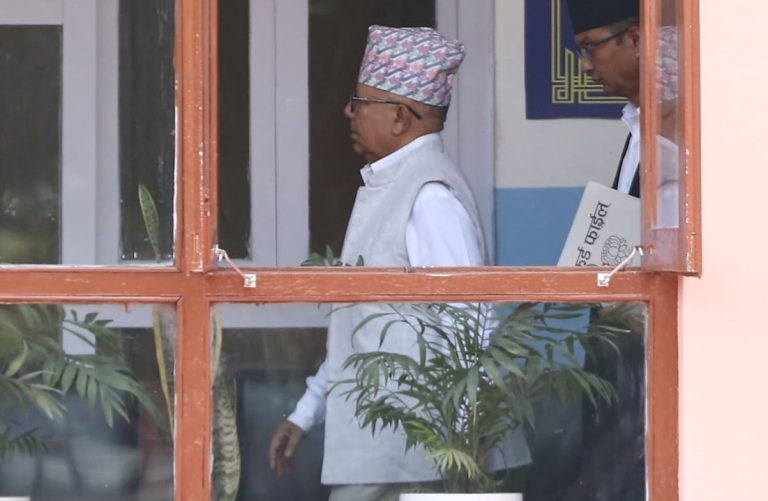Former Prime Minister Madhav Kumar Nepal has been granted release on bail in connection with a land misappropriation case. The special court announced on Wednesday that he can be freed upon payment of Rs 3.5 million.
The case is linked to alleged irregularities involving land dealings with a wellness and Ayurveda organization. The charges were brought forward by the Commission for the Investigation of Abuse of Authority (CIAA), which filed a corruption case citing misuse of public land.
Nepal appeared before the court for his official statement and detention hearing. After reviewing the submitted arguments, a three-member bench made the decision. The panel included judges Tej Narayan Singh Raya, Ram Bahadur Thapa, and Bidur Koirala.
The court ordered that Nepal be released on bail, provided the set amount is deposited. Once the payment is made, he will be allowed to return home and remain free while the legal process continues.
The bail decision came after a detailed hearing into Nepal’s involvement in the transaction. Investigators claim that during his time in office, government land was transferred inappropriately to a private company under the guise of promoting traditional health services.
The CIAA’s report highlights concerns over the transparency of the land transfer and its possible misuse by influential figures. Officials argue that such decisions should have followed legal procedures and proper valuation methods. The commission’s findings suggested that the actions resulted in a financial loss to the state.
Nepal, in his defense, denied any wrongdoing and claimed that the decision was made in the public’s interest. His legal team argued that the former leader had no direct personal benefit from the deal and had only approved plans recommended by relevant departments at the time.
The case has drawn significant attention across the country, especially because it involves a high-profile political figure. Legal experts see this as a critical test for Nepal’s anti-corruption drive and the court’s commitment to handling sensitive political cases fairly.
The special court clarified that granting bail does not affect the ongoing investigation or final verdict. The order simply allows Nepal to remain outside custody during the legal process, under the condition that he cooperates with further hearings and investigations.
Following the court’s order, arrangements were made to secure the bail amount. Family members and lawyers confirmed that the money would be deposited promptly to ensure Nepal’s timely release.
Observers have noted that the bail decision could set a precedent for other figures named in similar corruption probes. The court also reiterated that all accused persons, regardless of their position or status, must follow legal procedures.
Nepal, a long-time political leader, has held key positions in government and parliament. His release on bail does not close the case but marks a significant stage in the legal process. The next steps will involve further investigation, review of documents, and court proceedings to determine accountability.
The special court stated that the case will continue as per standard legal timelines, with updates expected as hearings progress. Authorities have not ruled out the possibility of further charges or new evidence coming to light as the probe continues.
Nepal’s supporters welcomed the court’s decision, expressing hope for a fair outcome. Meanwhile, critics remain concerned about the broader implications of such land deals and their impact on public resources.
As the legal process moves forward, attention will remain on how the judiciary handles cases involving powerful individuals. The case serves as a reminder of the need for transparency and accountability at all levels of government.


